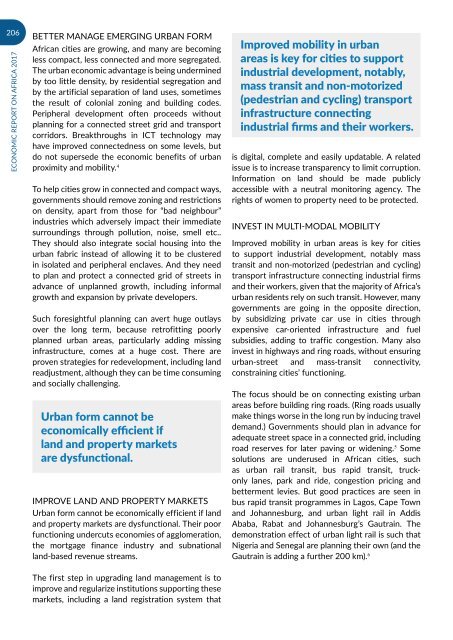URBANIZATION AND INDUSTRIALIZATION
Economic%20Report%20on%20Africa%202017%20UNECA
Economic%20Report%20on%20Africa%202017%20UNECA
Create successful ePaper yourself
Turn your PDF publications into a flip-book with our unique Google optimized e-Paper software.
206<br />
ECONOMIC REPORT ON AFRICA 2017<br />
BETTER MANAGE EMERGING URBAN FORM<br />
African cities are growing, and many are becoming<br />
less compact, less connected and more segregated.<br />
The urban economic advantage is being undermined<br />
by too little density, by residential segregation and<br />
by the artificial separation of land uses, sometimes<br />
the result of colonial zoning and building codes.<br />
Peripheral development often proceeds without<br />
planning for a connected street grid and transport<br />
corridors. Breakthroughs in ICT technology may<br />
have improved connectedness on some levels, but<br />
do not supersede the economic benefits of urban<br />
proximity and mobility. 4<br />
To help cities grow in connected and compact ways,<br />
governments should remove zoning and restrictions<br />
on density, apart from those for “bad neighbour”<br />
industries which adversely impact their immediate<br />
surroundings through pollution, noise, smell etc..<br />
They should also integrate social housing into the<br />
urban fabric instead of allowing it to be clustered<br />
in isolated and peripheral enclaves. And they need<br />
to plan and protect a connected grid of streets in<br />
advance of unplanned growth, including informal<br />
growth and expansion by private developers.<br />
Such foresightful planning can avert huge outlays<br />
over the long term, because retrofitting poorly<br />
planned urban areas, particularly adding missing<br />
infrastructure, comes at a huge cost. There are<br />
proven strategies for redevelopment, including land<br />
readjustment, although they can be time consuming<br />
and socially challenging.<br />
Urban form cannot be<br />
economically efficient if<br />
land and property markets<br />
are dysfunctional.<br />
IMPROVE L<strong>AND</strong> <strong>AND</strong> PROPERTY MARKETS<br />
Urban form cannot be economically efficient if land<br />
and property markets are dysfunctional. Their poor<br />
functioning undercuts economies of agglomeration,<br />
the mortgage finance industry and subnational<br />
land-based revenue streams.<br />
Improved mobility in urban<br />
areas is key for cities to support<br />
industrial development, notably,<br />
mass transit and non-motorized<br />
(pedestrian and cycling) transport<br />
infrastructure connecting<br />
industrial firms and their workers.<br />
is digital, complete and easily updatable. A related<br />
issue is to increase transparency to limit corruption.<br />
Information on land should be made publicly<br />
accessible with a neutral monitoring agency. The<br />
rights of women to property need to be protected.<br />
INVEST IN MULTI-MODAL MOBILITY<br />
Improved mobility in urban areas is key for cities<br />
to support industrial development, notably mass<br />
transit and non-motorized (pedestrian and cycling)<br />
transport infrastructure connecting industrial firms<br />
and their workers, given that the majority of Africa’s<br />
urban residents rely on such transit. However, many<br />
governments are going in the opposite direction,<br />
by subsidizing private car use in cities through<br />
expensive car-oriented infrastructure and fuel<br />
subsidies, adding to traffic congestion. Many also<br />
invest in highways and ring roads, without ensuring<br />
urban-street and mass-transit connectivity,<br />
constraining cities’ functioning.<br />
The focus should be on connecting existing urban<br />
areas before building ring roads. (Ring roads usually<br />
make things worse in the long run by inducing travel<br />
demand.) Governments should plan in advance for<br />
adequate street space in a connected grid, including<br />
road reserves for later paving or widening. 5 Some<br />
solutions are underused in African cities, such<br />
as urban rail transit, bus rapid transit, truckonly<br />
lanes, park and ride, congestion pricing and<br />
betterment levies. But good practices are seen in<br />
bus rapid transit programmes in Lagos, Cape Town<br />
and Johannesburg, and urban light rail in Addis<br />
Ababa, Rabat and Johannesburg’s Gautrain. The<br />
demonstration effect of urban light rail is such that<br />
Nigeria and Senegal are planning their own (and the<br />
Gautrain is adding a further 200 km). 6<br />
The first step in upgrading land management is to<br />
improve and regularize institutions supporting these<br />
markets, including a land registration system that


